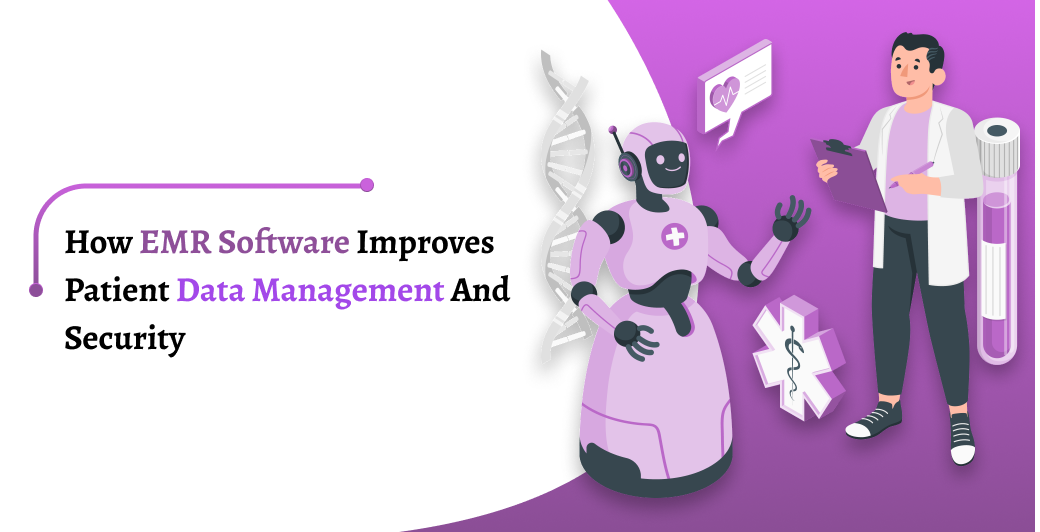With the current digital era, the health sector is fast embracing EMR Software to maximize patient data security and control. Effective data management is required in order to provide better patient care, and EMR Software securely stores, retrieves, and sends medical records.
With the development of technology, today’s EMR Systems are cloud-based and intelligent with AI integrated into their processes, thus becoming smarter and more trustworthy. In this article, we will learn what is EMR Software, how it improves patient data management, and why security is important to healthcare providers using EMR Software.
What is EMR Software?
EMR Software or Electronic Medical Records Software is an electronic platform for storing patients’ medical history, treatment schedule, laboratory test reports, medicines, and other patient health details. In comparison to paper-based records, an EMR System Hospital solution provides real-time access to patients’ data, reducing opportunities for errors and improving efficiency of the process.
Different EMR Software Providers offer advanced solutions for different healthcare needs. Artificial Intelligence-based EMR Software in India is gaining ground with hospitals and clinics turning toward going digital in order to deliver improved patient care and compliance with healthcare regulations.
Why EMR Software Impacts Patient Data Management
1. Easy storage and ready accessibility
All patient information is stored within a single database using EMR Software so that doctors and medical professionals can see data in plain sight. Access to patient history in real-time within a clinic or within an EMR System Hospital improves diagnosis and treatment results.
2. AI-Driven EMR Software for Data Accuracy
AI implementation in EMR Software eliminates human error during data entry. AI-powered EMR Software can detect inconsistency in medical reports and suggest a solution, enhancing consistency in data.
3. Real-Time Updating of Patient Records
Manual updating of records leads to half-baked or stale data. Excellent EMR Software updates patient records in real time, and doctors have access to latest available medical data at any given point of time.
4. Smooth Sharing of Information through Interoperability
Current EMR Systems are also interoperable, and data is shared easily between hospitals, clinics, and laboratories. It permits various healthcare providers to have secure access to the same patient information, fostering coordination and quality care.
5. Specialization among Different Specialties
There are different medical specialties with specific information management requirements. EMR Software Vendors create specialty-specific EMR Software like cardiology, dermatology, and orthopedics through which critical information is better managed.
How EMR Software Increases Security in Healthcare
1. Data Protection and Secure Access
Data protection is the largest concern in healthcare. EMR Software safeguards patient information by encrypting it and making it inaccessible to unauthorized individuals. Multi-factor authentication and biometric authentication further ensure access control.
2. Healthcare Compliance
EMR Software in India also complies with strict healthcare data security regulations such as HIPAA and NDHM standards. Patient data is thus safely processed and kept confidential.
3. Threat Detection using AI
AI-driven EMR Software continuously observes system activity for any potential security risk. When there is a suspicious login or data leakage, the administrators receive an immediate notification, preventing cyber attacks.
4. Data Backups and Disaster Recovery
Missing information is a hospital’s worst nightmare. Top-rated EMR Software products have cloud storage and backup, and patient files are readily available in the case of crashes or cyber attack.
Future of AI-Driven EMR Software
1. Predictive Analysis for Early Diagnosis
The AI-driven EMR Software is capable of examining the patients’ records for predictive analysis of possible medical risks. By doing so, the doctors are ready in advance against a disease advancing.
2. Blockchain for Data Security
Future EMR systems will adopt blockchain technology for greater data security and prevent any unauthorized changes.
3. Hand-Free Voice Recognition for Updating the Data
Voice command technology enabled by artificial intelligence in EMR Software will facilitate the doctors to voice update the patient records within the system and prevent transcription errors.
4. Cloud-Based EMR Software
Cloud-Based EMR Software applications will facilitate remote access to the patient records in which the healthcare practitioners will operate remotely.
5. AI Chatbots for Patient Engagement
AI-Powered EMR Software chatbots will assist patients in scheduling appointments, medication reminders, and answering general health questions.
Choosing the Best EMR Software
When choosing EMR Software, healthcare professionals must consider the following:
- Easy-to-Use Interface : Seamless interface and workflow efficiency.
- Data Security : Medical law compliance and robust encryption.
- Personalization Features : Personalization according to different specializations in medicine.
- Interoperability : Ability to be integrated with other health care systems.
- AI Integration : Support to incorporate AI features like predictive analysis and voice recognition.
Conclusion
The importance of EMR Software in healthcare cannot be larger. Apart from making the management of patient information more efficient, it also protects levels so that sensitive information is not revealed. AI-based EMR Software automates hospitals and clinics, removes errors, and makes patients better cared for.
With new technology, EMR Software Companies never fail to find ways to create improved, safer software. As a healthcare provider or as an administrator for a hospital, it is spending good money on the best EMR Software to have it easy and safe working with patient data.



